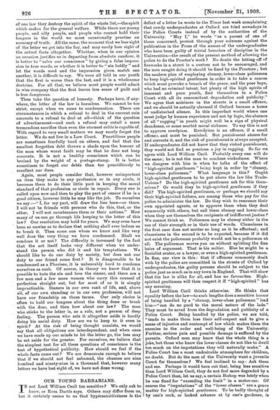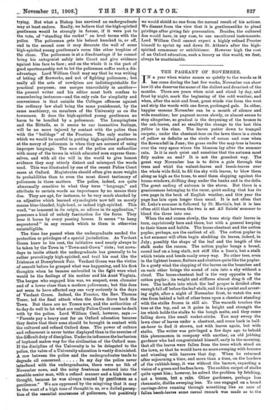OUR• YOUNG BARBARIANS.
IS not Lord William Ceeil too sensitive ? We only ask to know; as Rosa Dartle says. Others may differ from us, but it deitainly -seems to us that byperseiisitiveness Is the defect of a letter be wrote to the Times last week complaining that rowdy undergraduates at Oxford are tried nowadays in the Police Courts instead of by the authorities of the University. "May I," he wrote "as a parent of one of those concerned, *protest through your columns against the publication in the Press of the names of the undergraduates who have been guilty of trivial breaches of discipline in the Vniversities—the result of the present method of allowing the police to do the Proctor's work ? No doubt the letting off of fireworks in a street is a custom not to be encouraged, and the men caught doing it should be fined by the Proctors ; hut the modern plan of employing clumsy, lower-class policemen to keep high-spirited gentlemen in order is to take a course which must provoke a breach of the peace, and the poor boys, who had no criminal intent, but plenty of the high spirits of innocent and pure youth, find themselves in a Police Court with all its concomitant degradation and publicity." We agree that noisiness in the streets is a small offence, and we should be actually alarmed if Oxford became a home of undisturbed silence. In this imperfect world where one must judge by human experience and not by logic, the absence of all "ragging" in youth might well be a sign of physical decadence, or some morbid moral sickness. To say this is not to approve rowdyism. Rowdyism is an offence, if a small offence, and must be punished. But punishment atones for and corrects it, and the risk of punishment is always accepted. If undergraduates did not know that they risked punishment, they would not find so precious a joy in ragging. So far we agree with Lord William Cecil. Probably every one will do the same; he is not the man to condone wickedness. Where we disagree with him is when he• talks of the effect of "high-spirited gentlemen" being kept in order by "clumsy, lower-class policemen." What language is this ? Ought high-spirited gentlemen to be put above the law like Trade- Unions ? Do the high-spirited gentlemen ask for this them- selves ? Or would they be high-spirited gentlemen if they did? The high-spirited gentlemen, or perhaps we should, say their high-spirited fathers, are among those who pay for the police to administer the law. Do they wish to renounce their own appointed agents, or to approve them when they deal summarily with others, but call them clumsy and lower-class when they are themselves the recipients of indifferent justice ? We cannot think so. Policemen may be clumsy either in the use of their strength or in their use of words. Clumsiness in the first case does not matter so long as it be effectual; and clumsiness in the second is to be expected, because if it did not exist the policeman probably would not be a policeman at all. The policeman moves you on without splitting the fine hairs of argument. That is his mglier. Else he might be a Socialist orator, or a lawyer, or even a high-spirited gentleman. In fine, our view is this : that if offences commonly dealt With by the police are committed in the streets of Oxford by undergraduates, the guilty persons should be subject to the police just as much as in any town ih England. That will show that the law is alike for all, and has no favourites. High- spirited gentlemen will then respect it if " high-spirited " has any meaning.
Lord William Cecil thinks otherwise. He thinks that equality before the law—to such lengths does a sensitive horror of being handled by a "clumsy, lower-class policeman" lead him—" can do no good to the moral nature of the lads." They must be saved from the degradation and publicity of a Police Coda. Being handled by the police, we are told, "tends to make them lose their self-respect and to give a sense of injustice and contempt of law which makes them the enemies to the order and well-being of the University. Further, serious pain and possible damage is suffered by the parents. Oxford men may know that the whole thing is a joke, but those who know the lower classes do not like to dwell too much on the imputations they will naturally. make." A Police Court has a most undesirable atmosphere for children, no doubt. But do the men of the University want a juvenile Court for themselves ? We feel inclined to say : Ask them and see. Perhaps it would turn out that, being less sensitive than Lord William Cecil, they do not feel more degraded by a Police Court than, let us say, a certain Bishop was lately when he was fined for "exceeding the limit" in a motor-car. Of course the "imputations" of the "lower classes" are a grave matter for high-spirited gentlemen. To be badly thought of by 'Mid's cook, or looked askance at by one's gardener, is trying. But what a Bishop has survived an undergraduate may at least endure. Really, we believe that the high-spirited 'gentlemen would be strongly in favour, if it were put to the vote, of "standing the racket" on level terms with the police. The policeman gets his helmet knocked in, or off, and in the second case it may decorate the wall of some "high-spirited young gentleman's room like other trophies of the chase. The policeman is at a disadvantage if he cannot bring his antagonist safely into Court and give evidence .itgainst him face to face ; and on the whole it is the part of good sportsmanship not to let the policeman suffer such a dis- advantage. Lord William Cecil may say that be was writing of letting off fireworks, and not of fighting policemen; but really all the acts of rowdyism are indistinguishable for practical purposes; one merges unavoidably in another— the present writer and his editor must both confess to remembering instances—and the only rule for simplicity and convenience is that outside the Colleges offences against the ordinary law shall bring the same punishment, by the same machinery, on members of the University as on the townsmen. It does the high-spirited young gentleman no
• harm to be handled by a policeman. The Lumpingtons and the Hittalls, so it seems to our insensitive feelings, will be no more injured by contact with the police than with the " bulldogs " of the Proctors. The only matter in which we would be careful in putting high-spirited gentlemen at the mercy of policemen is when they are accused of using improper language. The ears of the police are unfamiliar with many of the terms in which educated men express them- selves, and with all the will in the world to give honest evidence they may utterly distort and misreport the words used. This was illustrated by one of the recent Police Court cases at Oxford. Magistrates should often give more weight to probabilities than to even the most direct testimony of policemen in these matters. The police, indeed, are quite abnormally sensitive to what they term "language," and attribute to certain words an importance by no means their due. They are apt, for instance, to be very much shocked by an adjective which learned etymologists now tell us merely means blue-blooded, high-bred, or indeed high-spirited. This word, "so innocent in its origin, so odious in its application," possesses a kind of unholy fascination for the force. They hear it borne by every passing breeze. It seems "to hang sequestered" in any remark which to them is otherwise unintelligible.
The time has passed when the undergraduate needed the protection or privileges of a special jurisdiction. As Verdant Green knew to his cost, the initiative used nearly always to be taken by the Town in "Town-and-Gown" riots ; but nowa- days to incite attack the undergraduate has generally to be rather provokingly high-spirited, and trail his coat like the Irishman at Donnybrook Fair. Verdant Green was the victim of assault before he grasped what was happening, and his first thoughts when he became embroiled in the fight were what would be the feelings of his mother and his Aunt Virginia. The bargee who engaged him was, we suspect, even clumsier and of a lower class than a modern policeman; but this does not seem to have affected any one very seriously in the days of Verdant Green. Indeed, the Proctor, the Rev. Thomas Tozer, led the final attack when the Gown drove back the Town. But there are no Tozers now, and the authorities of to-day do well to let what are really Police Court cases be dealt with by the police. Lord William Cecil, however, says :— " Parents pay a heavy cost for an Oxford education because they desire that their sons should be brought in contact with the cultured and refined Oxford dons. The power of culture and refinement is never better displayed than in the exercise of the difficult duty of discipline. Under its influence the barbarism of boyhood makes way for the civilisation of the Oxford man. If the discipline of the University is to be delegated to the police, the value of a University education is vastly diminished. A row between the police and the undergraduates tends to
degrade all concerned In my day the police never interfered with the undergraduates, there were no 5th of November rows, and the noisy freshman matured into the sensible senior man, with a refined manner and a high tone of thought, because he was always treated by gentlemen as a gentleman." We are oppressed by the misgiving that it may be the want of a high tone of thought in us, or a dulled percep- tion of the essential coarseness of policemen, but positively
we would shield no one from the normal result of his actions. We dissent from the view that it is gentlemanlike to plead privilege after giving fair provocation. Besides, the cultured don would have, in any case, to use uncultured instruments. Lord William Cecil cannot expect a highly refined Proctor himself to sprint up and down St. Aldate's after the high- spirited commoner or exhibitioner. However high the coat of an Oxford education, such a luxury as this would, we feat, always be unattainable.

































































 Previous page
Previous page